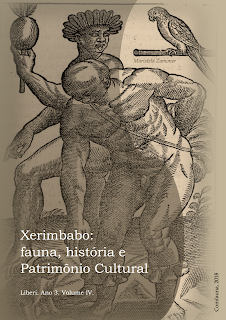Os povos indígenas relacionam-se de diferentes formas com a fauna nativa brasileira. Algumas delas são proibidas para populações não tradicionais, como a caça e a tapiragem. Entretanto, a prática do xerimbabo que consiste na manutenção de exemplares da fauna nativa brasileira como animais de estimação é permitida igualitariamente no país. Perante a Constituição Federal de 1988, tal prática tem atributos de patrimônio cultural imaterial, uma vez que depende de saberes específicos sobre modos de criar, fazer e viver, portando referência à identidade, à ação, à memória de grupos tradicionais indígenas formadores da sociedade brasileira. Como ação em favor da preservação da cultura imaterial do xerimbabo, propõe-se seu registro no Livro de Registros de Saberes do Instituto do Patrimônio Histórico e Artístico Nacional (IPHAN), uma vez que sua sobrevivência depende da preservação de conhecimentos e modos de fazer enraizados no cotidiano das comunidades multiculturais brasileiras.
Palavras chave: fauna silvestre; fauna nativa;xerimbabo; animal de estimação; Patrimônio Cultural Imaterial.
ABSTRACT
The indigenous people relate themselves with the native Brazilian fauna in different ways. Some of those are prohibited to non-traditional people, such as hunting and tapiragem. However, the exercise of xerimbabo, which consists in the maintenance of native Brazilian fauna samples such as pet animals, is accepted equally in the country. Before the Federal Constitution of 1988, such practice has attributes of immaterial cultural heritage, since that it depends on specific knowledge about ways of creating, making and living, alluding to the identity, to the action and to the memoir of traditional indigenous groups that formed the Brazilian society. As an act in favor of the preservation of the immaterial culture of xerimbabo, we propose its registry in the Book of Knowledge Registers of the National Institute of Historical and Artistic Heritage (IPHAN), as its survival depends on the preservation of knowledge and ways ingraining in the daily life of the multicultural Brazilian communities.


Nenhum comentário:
Postar um comentário